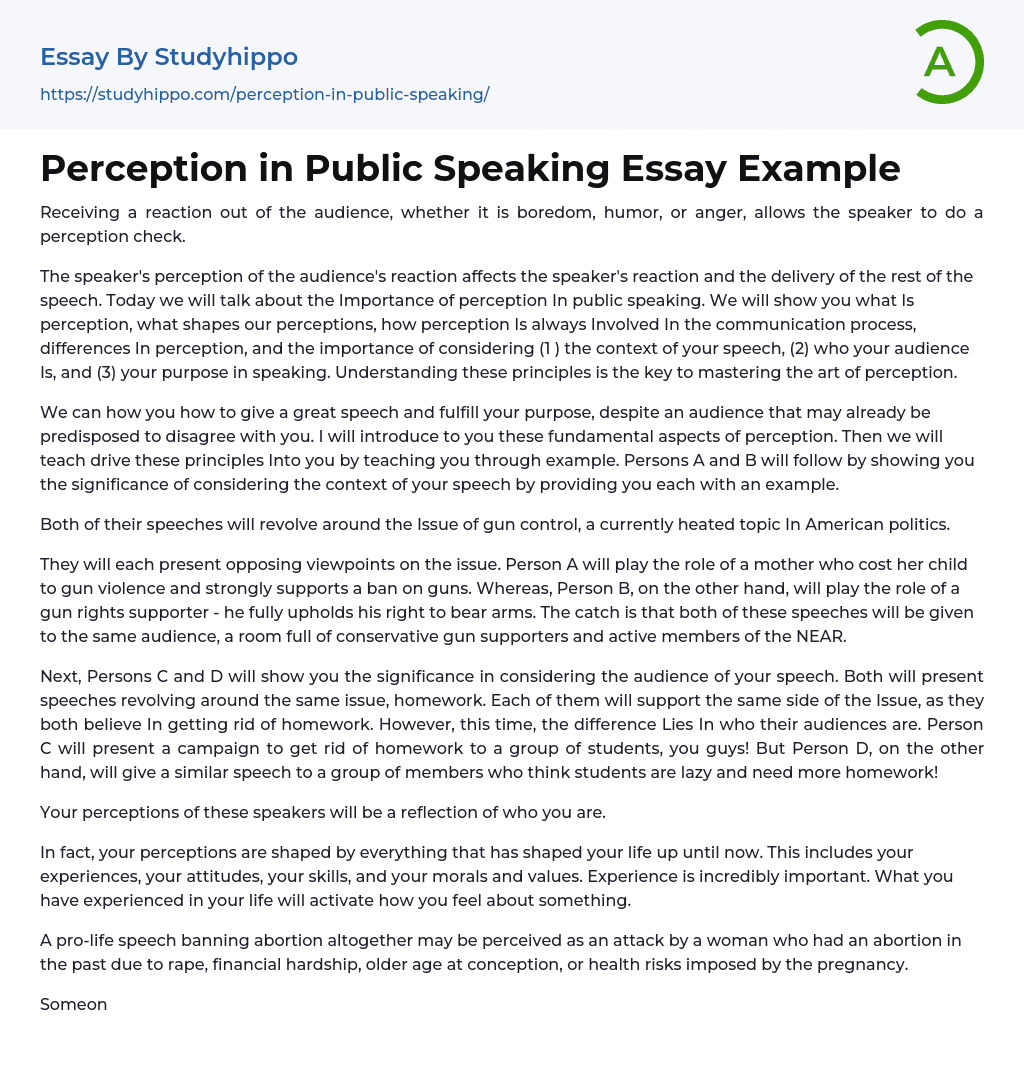Receiving a reaction out of the audience, whether it is boredom, humor, or anger, allows the speaker to do a perception check.
The speaker's perception of the audience's reaction affects the speaker's reaction and the delivery of the rest of the speech. Today we will talk about the Importance of perception In public speaking. We will show you what Is perception, what shapes our perceptions, how perception Is always Involved In the communication process, differences In perception, and the importance of considering (1 ) the context of your speech, (2) who your audience Is, and (3) your purpose in speaking. Understanding these principles is the key to mastering the art of perception.
We can how you how to give a great speech and fulfill your purpose, despite an audience that may a
...lready be predisposed to disagree with you. I will introduce to you these fundamental aspects of perception. Then we will teach drive these principles Into you by teaching you through example. Persons A and B will follow by showing you the significance of considering the context of your speech by providing you each with an example.
Both of their speeches will revolve around the Issue of gun control, a currently heated topic In American politics.
They will each present opposing viewpoints on the issue. Person A will play the role of a mother who cost her child to gun violence and strongly supports a ban on guns. Whereas, Person B, on the other hand, will play the role of a gun rights supporter - he fully upholds his right to bear arms. The catch is that both of these speeches will be given
to the same audience, a room full of conservative gun supporters and active members of the NEAR.
Next, Persons C and D will show you the significance in considering the audience of your speech. Both will present speeches revolving around the same issue, homework. Each of them will support the same side of the Issue, as they both believe In getting rid of homework. However, this time, the difference Lies In who their audiences are. Person C will present a campaign to get rid of homework to a group of students, you guys! But Person D, on the other hand, will give a similar speech to a group of members who think students are lazy and need more homework!
Your perceptions of these speakers will be a reflection of who you are.
In fact, your perceptions are shaped by everything that has shaped your life up until now. This includes your experiences, your attitudes, your skills, and your morals and values. Experience is incredibly important. What you have experienced in your life will activate how you feel about something.
A pro-life speech banning abortion altogether may be perceived as an attack by a woman who had an abortion in the past due to rape, financial hardship, older age at conception, or health risks imposed by the pregnancy.
Someone who identifies as gay will perceive a speech given on prohibiting same-sex marriage as a flagrant attack on basic human civil rights. Someone who regularly smokes marijuana will perceive a speech on legalizing marijuana as "you're preaching to the choir. " Perception can also be influenced by your attitudes. If your attitude toward attendance is indifference -
hey! Who cares? Way show up when way show up - then a speech by your professor criticizing tardiness will be perceived by you as an attack.
When you start folding your arms, crossing your legs, staring her down, and booing her from the back of the class, you're sending her a message in return.
How she perceives your message depends on her own background. She may perceive it as a challenge to crack down on her students harder, so she continues with more anger, popularizing you in return to react more aggressively. She may perceive it, instead, as a warning - that, hey, maybe, you've gone a bit too far - and so she backs down and mutinous her lecture, depopulating you to a more agreeable middle ground.
Knowing how to give a speech to an audience that will likely disagree with you is an art of mastering perception.
I mentioned key words: polarize and deplorable. You and your audience in this case are at polar opposites. You share different views. To make an effective speech, you have to reach a middle ground on which you agree. This may involve concessions from the speaker toward the views of his opposed audience to change the audience's perception of him in order to elicit a desired response out of the audience.
- Coaching essays
- Critical Thinking essays
- homework essays
- Learning essays
- Library essays
- Listening essays
- Literacy essays
- Mentor essays
- Physical Education essays
- Project essays
- Reading essays
- Research essays
- Sex Education essays
- Social Studies essays
- Standardized Testing essays
- Study Plan essays
- Teaching essays
- Consciousness essays
- Intelligence essays
- Mindset essays
- Perception essays
- Problem Solving essays
- Resilience essays
- Free Speech essays
- Freedom Of Speech essays
- Gettysburg Address essays
- Informative Speech essays
- Persuasive Speech essays
- Public Speaking essays




